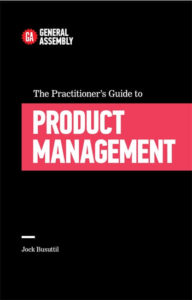
PRODUCTHEAD: Wartime vs peacetime product leadership
PRODUCTHEAD is a regular newsletter of product management goodness,
curated by Jock Busuttil.
product of war #
tl;dr
Wartime vs peacetime leaders employ different skill sets
Airbnb’s changes to product management could be just what is needed in wartime or equally a retrograde step
Working from home is a particularly polarising debate because it aligns with the leader-employee divide
Discussions about productivity are often a proxy discussion for some other dysfunction
every PRODUCTHEAD edition is online for you to refer back to
hello
This week I’ve been writing a monster article for the main blog on sharpening up your vision and strategy, which will go live on Wednesday. If I can just stop adding content to it, that is.
It’s a worked example of what I do when I start at a new organisation to assess the state of their vision and strategy, and the prompts I use to tighten up vagueness and re-align corporate strategy with vision, and in turn product strategy and vision with those.
Subscribe here for free to get it straight to your inbox when it’s published.
Wartime vs peacetime product leadership #
To tide you over until Wednesday, this week’s PRODUCTHEAD brings you articles that I’ve enjoyed reading recently, on the topic of the shift from ‘peacetime’ to ‘wartime’ product leadership, and the culture clashes that can emerge as a result.
We’ve seen a few high-profile examples recently of both the shift and the reaction it triggers.
Reddit has been embroiled in a feud with its powerful volunteer moderators. They’ve been protesting in reaction to massive hikes in the API pricing, which in turn are killing off many third-party apps that relied on the API. The increased API pricing is ostensibly in response to AI firms scraping Reddit content to train their large language models. (Arguably shutting the stable door after the horse has bolted.) But it could equally be an attempt to monetise the company after it missed its window to IPO at a strong valuation.
Then there was Airbnb CEO Brian Chesky’s recent talk at CONFIG (Figma’s annual conference). He spoke about how, like Apple, he had pulled product decision-making back up the organisation, how he had given designers more prominence, paired them with product managers, and had refocused product managers on product marketing. The talk led many to declare the demise of product management, not just at Airbnb, but everywhere.
Wartime product leadership kicks in when there is a threat to the very survival of a company — or at least at the point the leadership team starts taking that threat seriously. Often the trouble had been brewing for a while, but at some point it comes to a head.
Trade-offs between wartime and peacetime #
When the icy grip of panic seizes a CEO and causes them to make these dramatic cultural changes, it is understandably disorienting or off-putting to people more comfortable with ‘peacetime’ culture.
Typical symptoms are a shift in the balance of trade-offs:
top-down command and control over decision-making in autonomous, empowered teams
shorter-term wins over longer-term investments
action over analysis
focus on big bets over smaller incremental improvements
risk aversion over a healthy risk appetite
I’m framing these as trade-offs because each option carries with it different strengths and weaknesses. Neither is inherently right or wrong without a decent understanding of the context.
Command and control can work if the leadership team taking the decisions has excellent situational awareness, operates according to good product management principles, and can avoid the temptation of acting on pure instinct and assumptions alone.
Likewise, autonomous, empowered teams are only effective if they can find the right balance between thinking and doing, and understand how their actions have to align with and make progress towards the broader organisational goals.
Can’t blame COVID this time #
A few years ago, the COVID pandemic forced organisations to rapidly re-evaluate how they operated, particularly those whose business relied on face-to-face contact. It was a sudden and unanticipated bout of ‘wartime’. But every business was in the same boat, and one could hardly pin the lack of foresight of a global pandemic on the senior leadership teams.
The businesses that could adapt, survived. The ones that couldn’t quickly enough, or the ones that were circling the drain long before COVID put them over the edge, didn’t. But at least everyone could blame the pandemic.
But this time around, as the liquidity from all that cheap money (ironically facilitated by the recent pandemic) dries up, the finger of blame is pointing at leadership teams who perhaps should have seen their respective corporate crises coming.
Never waste a good crisis #
I quite like the adage, “never waste a good crisis”. The intent of the saying is that it’s easier to push through dramatic changes when there’s a major threat on the horizon and everyone is more receptive to any idea that will stave off disaster. In some organisations I’ve worked at, a good crisis was the only opportunity to cut through the bureaucracy and make any kind of meaningful change.
So when organisations are making these dramatic cultural and strategic changes, it could equally be a calculated act of opportunism to push through change as it could be a knee-jerk reaction to the icy grip of panic.
This week’s edition of PRODUCTHEAD #
For the articles this week, we’ve got to start with the 2011 Ben Horowitz article “Peacetime CEO/Wartime CEO”, particularly because it cites Steve Jobs’ return to Apple in 1997, just as Airbnb CEO Brian Chesky did in his polarising talk a few weeks ago.
After all the hot takes on Chesky concluding that product management is dead, Becky Yelland offers a more considered view in her article for Mind The Product.
Then, to explore the culture clash aspect in more detail, Mark Mortensen offers a balanced examination of why remote working has become an even more polarising topic post-COVID.
And to finish up, John Cutler also has been writing recently about culture clash, this time about differing takes on productivity. Enjoy the reads.
Speak to you soon,
Jock
what to think about this week
Peacetime CEO/Wartime CEO
Recently, Eric Schmidt stepped down as CEO of Google and founder Larry Page took over. … Eric Schmidt was much more than Google’s front man; as Google’s peacetime Chief Executive, he led the greatest technology business expansion in the last ten years. Larry Page, in contrast, seems to have determined that Google is moving into war and he clearly intends to be a wartime CEO. This will be a profound change for Google and the entire high-tech industry.
The Peacetime CEO does not resemble the Wartime CEO
[Ben Horowitz / Andreesen Horowitz]
Airbnb’s product management shift: the view from product leaders
The discussion on Airbnb’s decision to morph its product management function into a product marketing manager role has thrown up an interesting debate. This post canvasses the views of a number of well-known product leaders in an attempt to lay out the debate as clearly and concisely as possible.
Reports of our demise have been greatly exaggerated
[Becky Yelland / Mind The Product]
Tension is rising around remote work
While conflicting perspectives on remote work are not new, the tension seems to be escalating. Neither side holds all the power, and as the conversation becomes more and more polarized, it becomes more difficult to reach a mutually beneficial resolution. Leaders must actively collaborate with their employees to find a balanced approach to one of the most significant changes to the way we work since the industrial revolution.
A proxy debate for the divide between leaders and employees
[Mark Mortensen / Harvard Business Review]
Productivity (the clash)
When times are good, companies develop a mix of good habits and bad habits. When times get tough, they can no longer get by with bad habits. And in many cases, the habits that were a good fit for boom times are no longer a good fit for leaner times.
At a macro level, what I am seeing in the industry currently, is a battle for the narrative around those good and bad habits.
You are threatened. They are threatened. You’ll have to work through it.
[John Cutler / The Beautiful Mess]
recent posts
Always have a plan B
Have you ever wondered why product managers say “it depends” quite so often?
Always seeking the best possible compromise
[I Manage Products]
What games taught me about customer onboarding
Video games aren’t necessarily everyone’s cup of tea, but some of the most successful games and products share a common attribute: they help the user become more skilled throughout their journey.
Onboarding is really a continual process
[I Manage Products]
Should I take a product manager job in a sales-led company?
Hi Jock,
I’m currently applying for loads of product manager jobs. I’ve received an offer from a sales-led company where the Product team reports in to Sales. Should I take the job?
Demonstrate good practice AND deliver good product
[I Manage Products]
can we help you?
Product People is a product management services company. We can help you through consultancy, training and coaching. Just contact us if you need our help!
Helping people build better products, more successfully, since 2012.
PRODUCTHEAD is a newsletter for product people of all varieties, and is lovingly crafted from all the time I don’t spend commuting.


Leave a Reply